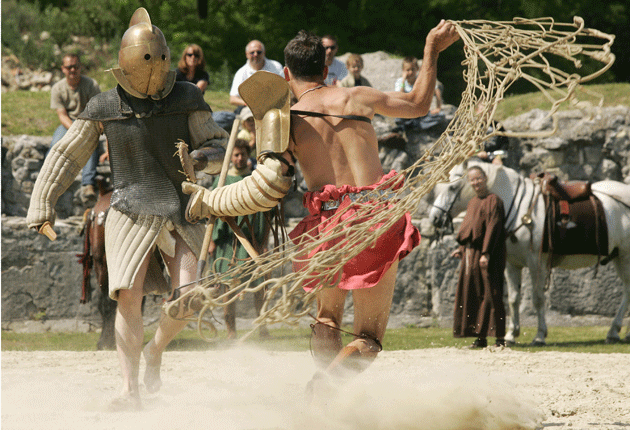
Your support helps us to tell the story
From reproductive rights to climate change to Big Tech, The Independent is on the ground when the story is developing. Whether it's investigating the financials of Elon Musk's pro-Trump PAC or producing our latest documentary, 'The A Word', which shines a light on the American women fighting for reproductive rights, we know how important it is to parse out the facts from the messaging.
At such a critical moment in US history, we need reporters on the ground. Your donation allows us to keep sending journalists to speak to both sides of the story.
The Independent is trusted by Americans across the entire political spectrum. And unlike many other quality news outlets, we choose not to lock Americans out of our reporting and analysis with paywalls. We believe quality journalism should be available to everyone, paid for by those who can afford it.
Your support makes all the difference.What courses? Classics; classical archaeology; classical art; Roman studies; ancient world; Greek; Latin.
What do you come out with? BA usually, or MA if you choose to study in Scotland.
Why do it? "With room for specialists and generalists, the Greco-Roman world offers something for everyone. Pots and plays, Plato and Pausanias – the range of areas Classicists study is exhilarating, offering a great base from which to branch out, alongside a grounding in an inherently fascinating area with excellent travel opportunities. The magic of ancient objects and the thrill of tracing their importance throughout history have inspired people for generations. Enhanced linguistic aptitude, sharp critical skills, excellence in creating and dissecting rhetoric, and a sensitive approach to intercultural issues make Classicists interesting people with excellent employment prospects – a group it’s well worth joining." - Dr Cressida Ryan, classics outreach officer, University of Oxford
What's it all about? Studying classical cultures and languages first and foremost, and generally this means Greek and Latin. Expect in-depth study of the languages and their structures, in order to be able to translate from ancient texts and understand their influence in the formation of modern European languages.You're also likely to focus on the history of these ancient civilizations, although approaches vary from university to university. The Oxford course is divided into the two sub-faculties of Classical Languages & Literature, and Ancient History & Classical Archaeology. The study of language and culture can be combined with history and archaeology, which requires a more practical approach.
Study options: Three-year BAs at most places and four years at St Andrews. The year abroad option with modern languages at King's College will push you up to four years. Durham has three single-honours degrees – Ancient history, classical past and classics – and joint honours programmes in ancient history and archaeology, and ancient, medieval and modern history.
What will I need to do it? Previous study in Greek or Latin will obviously help you progress quicker, although it’s not compulsory at most universities – Oxford has two pathways for classics students; one for those with a prior knowledge of the language and one for those without. As classics is, erm, classically, offered at older, highly-regarded universities, grade requirements can be tough. At Oxford you’ll need three As, at Cambridge it’s A*AA, and St Andrews ask for AAB.
What are my job prospects? Despite what one might think, people graduating from classical studies are highly valued by employers. Thanks to their studies, they learn to think logically, to compile and evaluate evidence and to express themselves clearly and succinctly both orally and in writing. Classicists can make their way into careers as diverse as computing, the civil service, gold dealing, insurance, journalism, law, accountancy, public relations and the wine trade. Further study is common, and according to The Times’ Good University Guide 2012, over one third of graduates choose to pursue a postgraduate degree. The same guide claims that 27 per cent of graduates are employed in graduate-level jobs within six months of finishing, earning a healthy average salary of around £21,000.
Where's best to do it? Oxford topped this year’s Complete University Guide, followed by Cambridge and Durham. Student satisfaction surveys produced the same top three.
Related degrees: History; Celtic studies; anthropology; archaeology; English.
Join our commenting forum
Join thought-provoking conversations, follow other Independent readers and see their replies
Comments